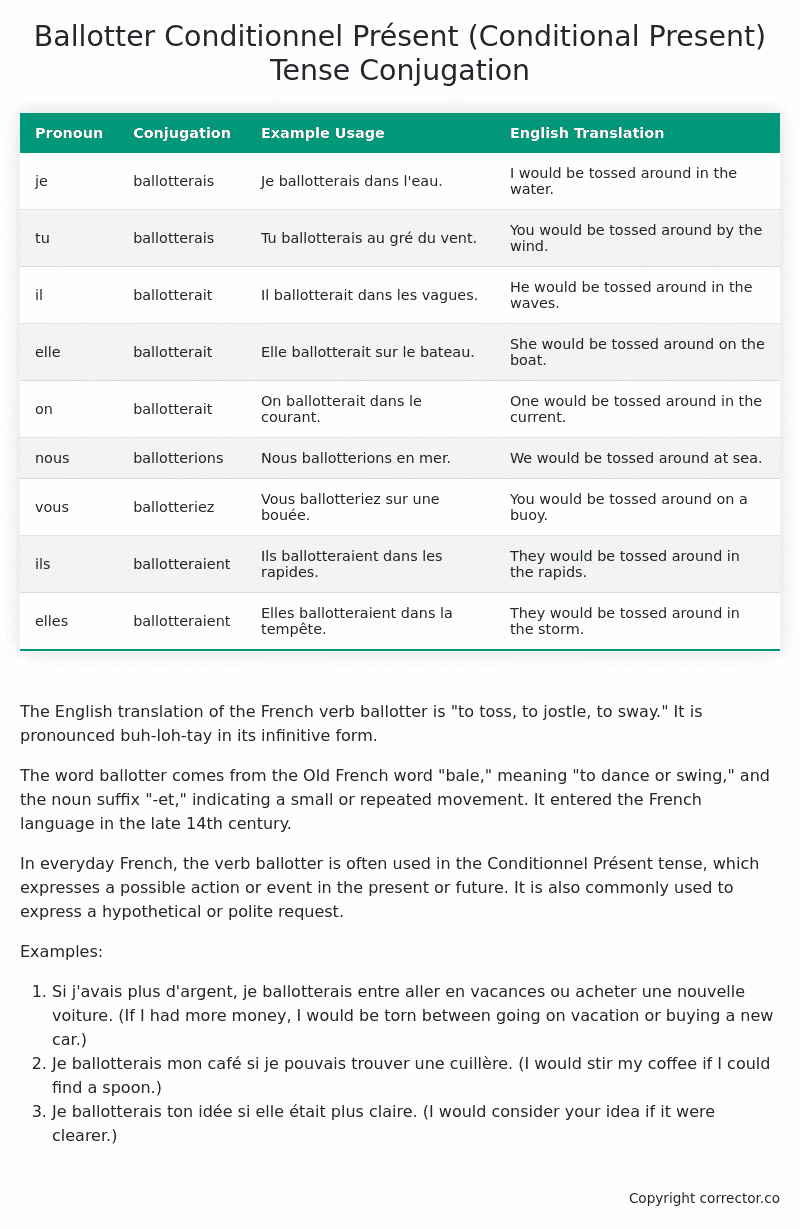Conditionnel Présent (Conditional Present) Tense Conjugation of the French Verb ballotter
Introduction to the verb ballotter
The English translation of the French verb ballotter is “to toss, to jostle, to sway.” It is pronounced buh-loh-tay in its infinitive form.
The word ballotter comes from the Old French word “bale,” meaning “to dance or swing,” and the noun suffix “-et,” indicating a small or repeated movement. It entered the French language in the late 14th century.
In everyday French, the verb ballotter is often used in the Conditionnel Présent tense, which expresses a possible action or event in the present or future. It is also commonly used to express a hypothetical or polite request.
Examples:
- Si j’avais plus d’argent, je ballotterais entre aller en vacances ou acheter une nouvelle voiture. (If I had more money, I would be torn between going on vacation or buying a new car.)
- Je ballotterais mon café si je pouvais trouver une cuillère. (I would stir my coffee if I could find a spoon.)
- Je ballotterais ton idée si elle était plus claire. (I would consider your idea if it were clearer.)
Table of the Conditionnel Présent (Conditional Present) Tense Conjugation of ballotter
| Pronoun | Conjugation | Example Usage | English Translation |
|---|---|---|---|
| je | ballotterais | Je ballotterais dans l’eau. | I would be tossed around in the water. |
| tu | ballotterais | Tu ballotterais au gré du vent. | You would be tossed around by the wind. |
| il | ballotterait | Il ballotterait dans les vagues. | He would be tossed around in the waves. |
| elle | ballotterait | Elle ballotterait sur le bateau. | She would be tossed around on the boat. |
| on | ballotterait | On ballotterait dans le courant. | One would be tossed around in the current. |
| nous | ballotterions | Nous ballotterions en mer. | We would be tossed around at sea. |
| vous | ballotteriez | Vous ballotteriez sur une bouée. | You would be tossed around on a buoy. |
| ils | ballotteraient | Ils ballotteraient dans les rapides. | They would be tossed around in the rapids. |
| elles | ballotteraient | Elles ballotteraient dans la tempête. | They would be tossed around in the storm. |
Other Conjugations for Ballotter.
Le Present (Present Tense) Conjugation of the French Verb ballotter
Imparfait (Imperfect) Tense Conjugation of the French Verb ballotter
Passé Simple (Simple Past) Tense Conjugation of the French Verb ballotter
Passé Composé (Present Perfect) Tense Conjugation of the French Verb ballotter
Futur Simple (Simple Future) Tense Conjugation of the French Verb ballotter
Futur Proche (Near Future) Tense Conjugation of the French Verb ballotter
Plus-que-parfait (Pluperfect) Tense Conjugation of the French Verb ballotter
Passé Antérieur (Past Anterior) Tense Conjugation of the French Verb ballotter
Futur Antérieur (Future Anterior) Tense Conjugation of the French Verb ballotter
Subjonctif Présent (Subjunctive Present) Tense Conjugation of the French Verb ballotter
Subjonctif Passé (Subjunctive Past) Tense Conjugation of the French Verb ballotter
Subjonctif Imparfait (Subjunctive Imperfect) Tense Conjugation of the French Verb ballotter
Subjonctif Plus-que-parfait (Subjunctive Pluperfect) Tense Conjugation of the French Verb ballotter
Conditionnel Présent (Conditional Present) Tense Conjugation of the French Verb ballotter (this article)
Conditionnel Passé (Conditional Past) Tense Conjugation of the French Verb ballotter
L’impératif Présent (Imperative Present) Tense Conjugation of the French Verb ballotter
L’infinitif Présent (Infinitive Present) Tense Conjugation of the French Verb ballotter
Struggling with French verbs or the language in general? Why not use our free French Grammar Checker – no registration required!
Get a FREE Download Study Sheet of this Conjugation 🔥
Simply right click the image below, click “save image” and get your free reference for the ballotter Conditionnel Présent tense conjugation!

Ballotter – About the French Conditionnel Présent (Conditional Present) Tense
Formation
Common Everyday Usage Patterns
Expressing Polite Requests
Expressing Hypothetical Situations
Expressing Doubt or Uncertainty
Interactions with Other Tenses
Present Tense
Past Tense
Future Tense
Conditional Perfect
Summary
Want More?
I hope you enjoyed this article on the verb ballotter. Still in a learning mood? Check out another TOTALLY random French verb conjugation!


